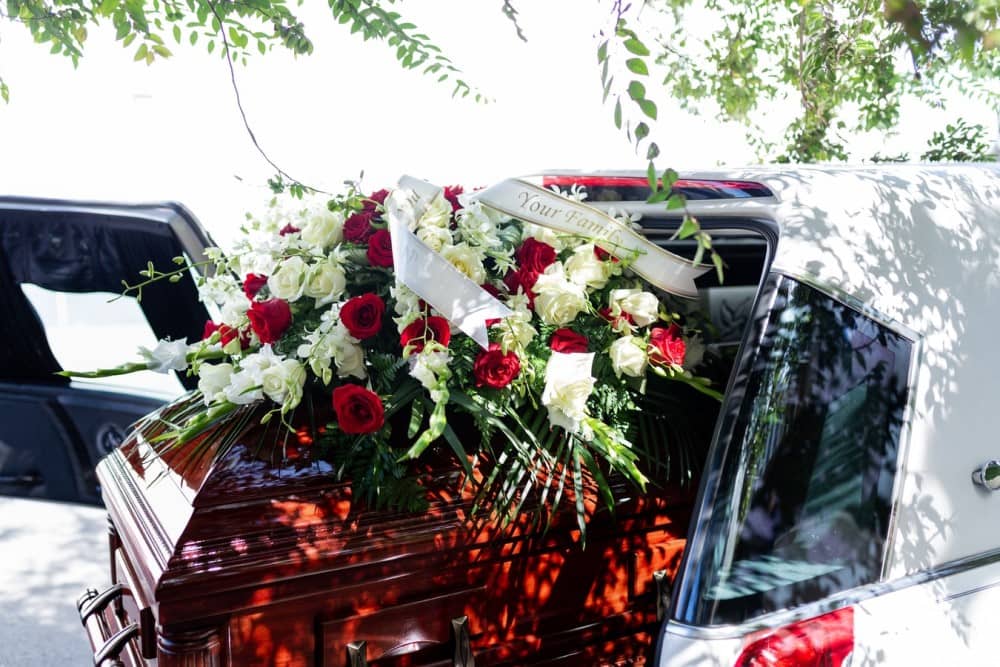Funeral planning is no one’s favorite job. It’s an already unpleasant situation that’s made worse by a confusing list of fees and requirements. As well, some funeral homes add to that confusion by withholding information or pushing you into goods and services you don’t really need.
For those reasons, it’s incredibly useful to research funeral costs before you talk to the funeral home. One starting point is the median funeral cost data compiled by National Funeral Directors Association (NFDA). According to the NFDA report, total average funeral costs range from $7,000 to $9,200. That range, however, does not include the separate, but necessary fees charged by the cemetery — including the actual funeral plot, headstone, and fees for opening and closing the grave. These expenses along with others could be included in what’s called cash advances, which are goods and services that the funeral home buys on your behalf. When you account for these charges, the average funeral cost is probably closer to $10,000 or more for a fairly basic set of final burial services.
As you might expect, your costs could be higher or lower, depending on various factors. Casket prices, the cost of cremation, embalming, service fees, and transportation, for example, can vary widely by zip code or state. There’s also some natural variation in total costs based on the services you choose — such as whether you request a simple direct cremation or a more elaborate package that includes a viewing, service, floral arrangements, printed funeral program, and a premium casket.
Average funeral cost breakdown
The table below shows a breakdown of common expenses you’ll face as you are planning. They are organized into three cost categories: funeral fees, charges for other services and merchandise, and cash advances. Further explanation, along with more detail on the line items, is provided below.
| Service | Median cost | Required/Optional |
| Basic funeral fees | $2,200 | Required |
| Other services and merchandise | ||
| Transportation of remains to funeral home | $350 | Required |
| Embalming | $750 | Optional |
| Preparation of the body | $255 | Optional |
| Cremation fee | $350 | Optional |
| Viewing: use of facility and staff | $425 | Optional |
| Ceremony: use of facility and staff | $500 | Required |
| Hearse or car | $150-340 | Optional |
| Printed materials | $175 | Optional |
| Flowers | $500 | Optional |
| Casket | $2,500 | Required unless cremated |
| Cremation casket | $1,200 | Required if cremated |
| Urn | $295 | Required if cremated |
| Vault | $1,500 | Optional |
| Headstone | $300+ | Required |
| Funeral plot | $1,000+ | Optional if cremated |
| Cash advance fees | Vary by funeral home | Some are required |
Table data source: NFDA, except where noted
Funeral fees
A funeral home will always charge you its basic service fee, which covers general planning and coordination of the services you request. Basic service fees average about $2,200.
Transportation of the remains to the funeral home
A typical cost for transporting the body to the funeral home is $350.
Embalming
Embalming fees average $750 nationwide. The funeral home may not tell you this, but you should know that embalming is not always required. If the body will be cremated immediately, for example, there’s no need to embalm it.
Embalming is recommended when there is a viewing or there is a delay between the time of death and the funeral ceremony — though you could possibly request refrigeration instead. If the body is being transported across state lines, embalming may be a legal requirement.
Preparation of the body
The funeral home will charge you $255 on average to prepare the body for viewing and visitation. Preparation services involve dressing, applying make-up, and hair styling. If the final arrangements won’t include viewing or visitation, you don’t need this service.
Cremation fee
The cremation fee itself should only be a few hundred dollars, but you’ll also incur viewing and services costs and the cost of a cremation casket. You can keep the overall fees low if you aren’t attached to the idea of hosting a viewing. In that case, you might trim your costs by about $1,500 because you wouldn’t need embalming, a viewing casket, or preparation of the body.
Viewing
If you opt for a viewing, you’ll pay about $425 for use of the funeral home’s facilities and staff. That’s on top of the charges for embalming and preparation of the body.
Ceremony and related costs
Funeral homes charge about $500 on average for facility and staff costs related to the ceremony. You might also spend another $150 to $350 on a hearse or car to transport the casket or urn to the burial site, $175 on printed programs, and $500 or more on flowers.
Flowers are an easy area for cost savings. It’s acceptable to ask friends and family to send flowers to the funeral home so you won’t have to purchase arrangements.
Casket costs
The casket may be your highest-ticket item related to the funeral, with costs ranging from $2,000 to $10,000. Funeral homes may try to push you into the higher end of that range by only presenting you with the expensive options. You may need to ask specifically to see caskets priced less than $5,000. You also have the option to purchase a casket from a third-party and have it shipped to the funeral home. The funeral home is required by the FTC to use your third-party casket without extra charges.
If you opt for cremation, you still need a casket for viewing and also for the cremation itself. Ask about renting the viewing casket, which should cost about $500. Average cost on a cremation casket from the funeral home is $1,200, but you may have the option to purchase a less expensive, unfinished wood box instead.
Urn
Purchasing an urn from the funeral home will cost about $300 on average. You can save on this line item by purchasing your own from an online shop. You can find attractive urns priced as low as $50.
Vault, headstone, or grave liner
A burial vault is an enclosure for the casket that’s placed in the grave. You should know that burial vaults are generally not intended to preserve the body or the casket; instead, they’re designed to keep the grave from sinking over time. The average cost of a burial vault is $1,500.
Not all cemeteries require a burial vault, though this may be positioned as an essential expense. Ask if you can use a less expensive grave liner or no liner instead.
Cash advances
Cash advances are fees for goods and services that the funeral home buys on your behalf. Examples include flowers, officiant services, police escorts, obituary fees, and chairs and tents. Some funeral homes mark up these costs or add a service fee. Know that the FTC requires the home to disclose in writing that you’re being charged extra. You may need to ask how the markup or service fee is calculated.
Funeral plot
The costs associated with funeral plot will be over-and-above the fees you pay to the funeral home. These plot-related costs can be $2,000 to $4,000 upfront, with additional charges for opening and closing the grave, placing the casket, and maintaining the gravesite. If you don’t work through the cemetery directly, you may see these charges as cash advance fees from the funeral home. Either way, be sure to clarify maintenance expenses. These can be billed as ongoing monthly or annual service fees.
Funeral costs by state and region
While the average funeral cost nationwide is about $10,000, costs in your area could be quite different. Life insurance company Lincoln Heritage reports that a full-service funeral in Arizona might only cost you $2,630. But those who live in Washington, D.C., could pay $13,000 or more. New Jersey residents represent the middle ground, with average funeral costs of $6,605.
The NFDA breaks down its funeral cost data into regions rather than states. Median regional expenses for a funeral that includes viewing, ceremony, and burial services are as follows:
- New England: $7,612
- Mid-Atlantic: $7,849
- South Atlantic: $7,461
- East South Central: $7,353
- West South Central: $6,933
- East North Central: $7,855
- West North Central: $8,123
- Mountain: $6,907
- Pacific: $7,290
Again, these numbers do not include expenses associated with the funeral plot or services provided by vendors other than the funeral home.
Do your homework and ask questions
The biggest challenge in keeping funeral costs low is remaining calm and remembering to question the advice provided by your funeral home director. There’s a reason the FTC governs funeral home sales practices — it’s to protect you. You can add another layer of protection by learning as much as you can about funeral costs before you have to make the buying decisions. For additional information, see the FTC’s Funeral Costs and Pricing Checklist. The more knowledge you have, the better prepared you’ll be to negotiate a service package that honors your loved one without breaking the bank.
Funeral costs can be an unexpected and sometimes overwhelming expense for loved ones. The death benefit can take weeks or months to pay out, which means some individuals may struggle to pay for expensive funeral costs upfront. If you’re concerned about these costs and want to ensure your family has money in-hand when you pass, consider selling your life insurance policy through a life settlement rather than waiting for the death benefit. By selling your policy, you’ll receive a large cash sum that can be used while you are still alive to assist with living expenses or serve as an emergency fund for costs like a funeral.
Contact Harbor Life Settlements today for a free policy estimate to see how much your life insurance policy could be worth!









